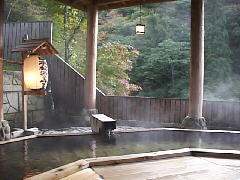Katakana words are often used to represent words that reflect onomatopoeia. You probably don’t recognize the word “onomatopoeia”, but you probably use this style of word every day. Onomatopoeia words are often used to describe “sounds” of things. When a firecracker explodes, you probably say “bang!” When you want to describe the sounds of a cat, you probably say “meow”. These are both examples of onomatopoeia. There are a lot more onomatopoeia in Japanese than there are in English, but we will cover only a few of these.
Click each of the following linkls to see what they represent.
| ワンワン | The sound of a dog |
| モーモー | The sound of a cow |
| コケコッコー | The sound of rooster |
| ゴロゴロ | The sound of thunder |
| ピンポーン | The sound of door bell |
![]() Hot Springs おんせん(温泉)
Hot Springs おんせん(温泉)

Natural hot springs (おんせん、温泉) are numerous and highly popular across Japan. Almost every region of the country has its share of hot springs and the resort towns that surround many of them.
There are many types of hot springs, and they are distinguished by the minerals dissolved in the water. Different minerals provide different health benefits. All hot springs are supposed to have a relaxing effect on your body and mind.
Hot spring baths come in many varieties: indoor and outdoor, gender separated and mixed, developed and undeveloped. Many hot spring baths belong to a ryokan (りょかん、旅館) or traditional Japanese Inn, while others are public bath houses. An overnight stay at a hot spring ryokan is a highly recommended experience for any visitor of Japan.
![]() Negative Words Presentation
Negative Words Presentation
Please view the presentation about positive versus negative words used in the classroom. Be sure to review common Kanji you should know at this point, and familiarize yourself with new Kanji you see in this presentation.
Click Begin or click Begin below.
Here is a print version of this actvity. You will still need to use the online version to hear the words.
![]() Negative Words
Negative Words
You will review how to make sentences negative in Japanese by changing the verb ending for present and past tense (in formal forms).
ゆみこさんはべんきょうしません。Present Tense Verb-ません
由美子さんは勉強しませんでした。Past Tense Verb-ませんでした
| いつも勉強します。 | いつも勉強しません。 |
| だれかよく勉強します。 | だれもよく勉強しません。 |
| 何かべんきょうします。 | 何も勉強しません。 |
| 何かありますか。 | 何もありません。 |
![]() Positive and Negative Predicates
Positive and Negative Predicates
Note the meaning of each of the following and how they are used positively and negatively. Note the use of the particle か on the left side and the particleも on the left side (and note that these particles are used differently in these patterns than in patterns you learned in the past).
Click each Play button to hear it aloud.
| ~か
|
Some~ | ~も…negative predicate
|
No~ |
| だれか
|
Someone | だれも…negative predicate
|
No one |
| なにか
|
Something | なにも…negative predicate
|
Nothing |
| どこか
|
Somewhere | どこも…negative predicate
|
Nowhere |
| いつか
|
Sometime | いつでも…negative predicate
|
Whenever |
| なぜか
|
Somehow | なぜでも…negative predicate
|
No matter what |
In the table below practice answering each question negatively using the negative predicates shown above. Be sure to use the correct negative expression that corresponds to the affirmative expression you see. Make sure you understand what each question and answer means based on the chart above.
Click each question to see the correct response.
| だれかがフランス語を話しますか。 | 。いいえ、だれもをはなしません。 |
| ちゅうごく(中国)に何かがほしい(欲しい)ですか。 | なにもほしくないです。 |
| 今日どこかにいきましょうか? | ぐあいがわるいですから、どこもいきたくないです |
| いつかそこでたべましょう! | いつでもいいですよ! |
| なぜかかれが東京から来ました。 | なぜでも会いたくないです! |
![]() Graded Assignments
Graded Assignments
Please return to the Section 2 Tasks & Assignments folder to complete the graded assignments for Section2, Part A.

